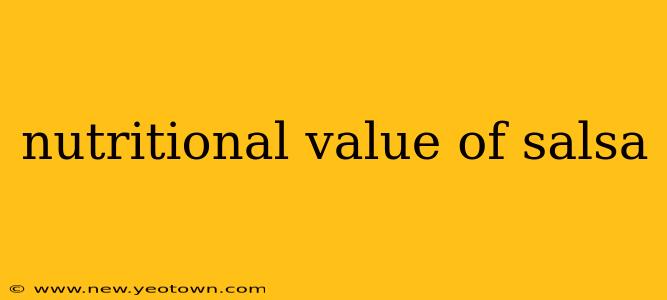Salsa! The vibrant, zesty condiment that elevates tacos, chips, and countless other dishes. But beyond its tantalizing taste, salsa boasts a surprising array of nutritional benefits. It's more than just a delicious topping; it's a nutritional powerhouse packed with vitamins, minerals, and antioxidants. Let's delve into the rich nutritional profile of this culinary gem.
What are the main nutritional benefits of salsa?
The nutritional value of salsa varies greatly depending on the specific recipe. However, a typical homemade salsa, brimming with fresh ingredients, offers a wealth of health advantages. The foundation of most salsas – tomatoes, onions, peppers – are naturally low in calories and high in essential nutrients. These ingredients contribute significantly to salsa's impressive nutritional profile. We're talking vitamins, minerals, and antioxidants that support overall well-being.
Is salsa good for weight loss?
Yes, salsa can be a valuable asset in a weight-loss journey. Because it's low in calories and high in fiber, it can help you feel full and satisfied, reducing overall calorie intake. The fiber content promotes healthy digestion and helps regulate blood sugar levels, further supporting weight management. A spoonful or two of salsa can add a significant flavor boost to your meals without adding many calories. Think of it as a delicious, healthy way to enhance your meals and curb those unhealthy cravings!
Is salsa healthy for your gut?
Absolutely! Salsa's rich fiber content is a boon for gut health. Fiber acts as prebiotic food for the beneficial bacteria in your gut, promoting a healthy microbiome. A thriving gut microbiome is linked to improved digestion, enhanced immunity, and even better mental well-being. Plus, the variety of ingredients in salsa, often including onions and garlic, further supports gut health. These ingredients contain compounds known to have prebiotic properties.
How many calories are in a serving of salsa?
The calorie count of salsa varies widely depending on the recipe and ingredients. A typical serving (about ½ cup) of homemade salsa with minimal added ingredients may contain anywhere from 15 to 30 calories. However, store-bought salsas can sometimes contain added sugars, oils, and preservatives, which can significantly increase the calorie count. Always check the nutrition label if you're buying pre-made salsa to be aware of its calorie and nutritional content.
What are the vitamins and minerals in salsa?
Salsa is a surprisingly good source of various vitamins and minerals. The tomatoes provide a significant dose of Vitamin C, a powerful antioxidant that supports the immune system. Onions and peppers contribute vitamins A and K, both essential for various bodily functions. Depending on the recipe, you may also get a boost of potassium, essential for maintaining healthy blood pressure. The exact vitamin and mineral content depends on the specific ingredients and their quantities in the salsa.
Does salsa have any negative effects?
While generally healthy, salsa can have some potential drawbacks. Individuals with sensitive stomachs might experience discomfort from the acidity of tomatoes. Also, store-bought salsas often contain high levels of sodium, which can be detrimental for those with high blood pressure or other health conditions. Choosing fresh, homemade salsa with minimal added ingredients helps minimize these potential negative effects.
Conclusion: Embracing the Nutritional Benefits of Salsa
Salsa offers far more than just a burst of flavor; it’s a nutritional powerhouse conveniently packed into a delicious condiment. From supporting weight loss to promoting gut health and providing essential vitamins and minerals, salsa deserves a prominent place in a healthy diet. So, next time you're reaching for a tasty topping or looking for a way to boost the nutritional value of your meal, remember the surprising benefits of this vibrant condiment. Embrace the zest, embrace the health!

